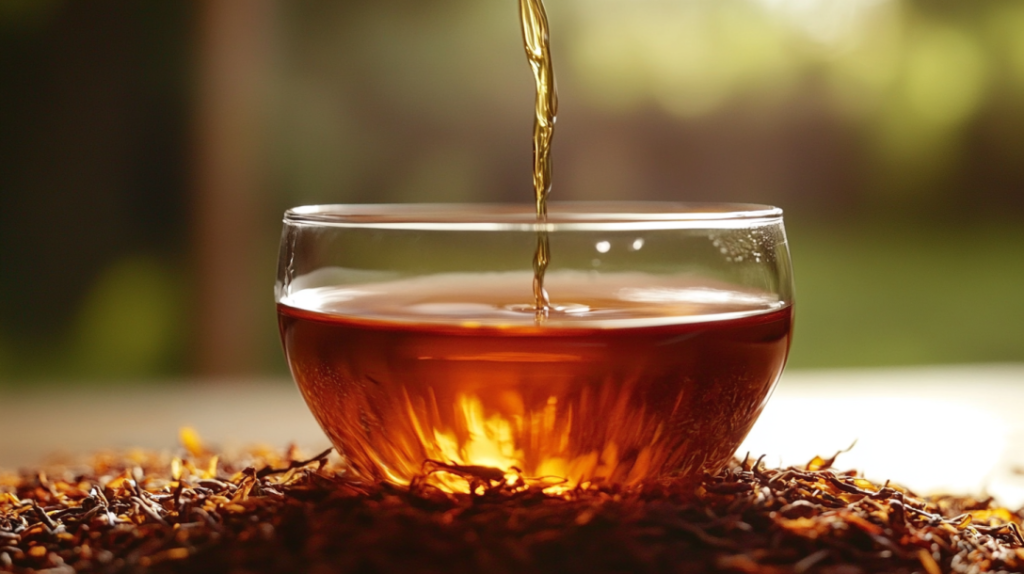Recently updated on: September 16th, 2024
Rooibos tea, or red bush tea, is a unique herbal beverage with a distinct flavour and numerous health benefits. It has recently achieved worldwide recognition. Aspalathus linearis is a plant native to South Africa’s Western Cape, and its leaves are used to manufacture this caffeine-free tea.
Rooibos is a distinct beverage with numerous benefits that set it apart from the crowd of Camellia sinensis-based teas. This article will look at the history of Rooibos tea, its potential health benefits, and its growing appeal among tea experts and health-conscious customers.
The Unique Attributes of Rooibos Tea
Rooibos tea is distinguished from other forms of tea by its reddish-brown hue and powerful, sweet flavour. Its caffeine-free status distinguishes it from other teas and makes it an excellent choice for anyone looking to avoid caffeine’s stimulating effects. Caffeine-sensitive folks and those looking to reduce their caffeine intake would benefit from Rooibos. Because it has fewer tannins than normal tea, it tastes sweeter and less astringent, attracting more customers.
A Wealth of Antioxidants
One of the primary benefits of Rooibos tea is its high antioxidant content. Polyphenols, flavonoids, and aspalathin are all powerful antioxidants found in Rooibos. These antioxidants are critical for avoiding cell damage by neutralizing free radicals, reducing oxidative stress, and protecting cells from oxidative stress. Rooibos’ high antioxidant content has made it a popular choice among those looking to improve their health in various ways.

Plant extracts
We offer a carefully selected range of plant extracts, primarily including powder extracts, water-based, oil-based, alcohol-based, and glycerin-based extracts. Our products are ideal for the pharmaceutical, medical, cosmetic, and food industries. The abundance of natural active ingredients in these extracts makes them suitable for use in many products.
Additionally, our offer includes CO2 extracts obtained through high-pressure extraction with natural carbon dioxide in a supercritical state. These extracts, derived from herbs, spices, and other plants, are excellent bioactive ingredients, aromas, and fragrances. Their highly concentrated form perfectly enhances dietary supplements, cosmetics, perfumes, food products, and beverages.
All our extracts have halal certificates and kosher certification, confirming their highest quality and compliance with religious requirements.
Promotes Heart Health
According to several research, Rooibos tea may be advantageous to the cardiovascular system. The antioxidants in Rooibos have been linked to improved heart health, specifically via lowering inflammation and blood pressure. According to studies, drinking Rooibos tea may also help lower cholesterol levels. It has been shown to increase HDL levels while decreasing LDL levels. All these factors combine to make Rooibos an excellent alternative for anyone searching for all-natural ways to boost their cardiovascular health.
Supports Digestive Health
Rooibos tea has also been linked to improved digestive health. According to some research, the flavonoids and polyphenols in Rooibos have shown potential in treating digestive issues such as diarrhea and stomach pains. Herbal teas are also easier on the digestive system than normal teas due to the lack of caffeine and low tannin content. For people experiencing digestive trouble, Rooibos is a soothing and enjoyable solution.
Potential for Managing Diabetes
In research, the effects of Rooibos on diabetes control have shown promising results. Aspalathin, a substance found in Rooibos, has been related to anti-diabetic properties. Aspalathin has shown promise in several clinical trials to help people with diabetes and those at risk of developing the disease by enhancing insulin sensitivity and cellular glucose uptake. The findings are promising, but more research is needed to understand whether Rooibos might assist in managing diabetes.
Immune-Boosting Properties
A strong immune system is required to maintain excellent health and well-being. Rooibos tea contains vitamin C, which is well-known for its ability to improve the immune system. Regular use of Rooibos has been related to better immune function, which supports the body in battling infections and other diseases. Furthermore, the antioxidants in Rooibos enhance the body’s immunological function, making it an important supplement to one’s diet, especially during heightened sensitivity.
Promoting Skin Health
Rooibos tea is advantageous to both internal and external health. The antioxidants in Rooibos protect the skin from oxidative stress and environmental damage. When used topically, Rooibos extract contains anti-inflammatory and relaxing properties that may make it effective for treating skin problems such as eczema and acne. Incorporating Rooibos tea into one’s daily regimen allows one to adopt a more holistic approach to keeping skin healthy and beautiful.
Comparison with Other Herbal Teas
The relative position of Rooibos tea may be noted when contrasted with other most taken herbal teas such as chamomile, green, and hibiscus teas.
Regarding the taste, Rooibos has a sweet taste with an earthy flavour, while chamomile has a gentle and floral taste, and hibiscus is tart. While green tea tends to be bitter because of tannin content, Rooibos contains low tannins which makes it taste less bitter than green tea. For the advantages, green tea contains catechins and enhances metabolism while chamomile can be used to calm the mind and improve sleep. On the other hand, hibiscus tea has its advantages such as reducing blood pressure in the body.
Other benefits which can be attributed to the consumption of Rooibos include increased heart health, digestion and immunity boosted by the presence of antioxidants, it is a caffeine-free tea ideal for anyone who wishes to replace coffee or tea.
Different Types and Flavors
Rooibos come in two main varieties: red, and green. The red Rooibos is the most popular and when it is fermented, it assumes a reddish-brown hue with a naturally sweet taste. The green Rooibos is lighter oxidized contains more grass flavours and has high antioxidant content compared to its oxidized type.
Furthermore, Rooibos can be blended, commonly with spices; vanilla or citrus flavours to complement the inherent natural sweetness. These blends satisfy a variety of tastes, and thus, Rooibos is not only a healthy beverage but also a great drink for lovers of tea.
Preparation Methods and Recipes
Rooibos tea can be made the conventional way or they can be incorporated in many other ways. The most common way to prepare it is to directly immerse the leaves in hot water and steep the mixture for 5-7 minutes, while some may opt for the French press for a more intense taste. Rooibos can also be served as an iced tea or blended with other secret ingredients for unique serving methods. Rooibos can be used in cooking in cases where it can be added during the baking process or can be used to add flavours to stews, sauces and even in cocktails. Another example of a dish derived from this plant is the Rooibos latte which can be prepared by adding steamed milk and honey.

Potential Risks and Side Effects
Despite Rooibos tea being considered a safe tea, there are measures needed for some groups of people. For instance, pregnant women should seek the doctor’s approval before taking large quantities of herbals because some of the element’s present in herbal teas affect pregnancy-related factors. It should also not be consumed by people who are allergic to plants in the Fabaceae family as this may lead to allergic reactions. Even though it is quite unlikely to over-consume Rooibos, it cannot be said that they are entirely incapable of interaction with some medicines prescribed for liver disorders or renal diseases.
Conclusion
Rooibos tea’s unique features and potential health advantages make it an intriguing option for tea connoisseurs and those worried about their health. Rooibos stands out among herbal beverages due to its ability to help regulate diabetes, protect against heart disease, and have a high antioxidant content.
It is not only a healthy supplement to daily living, but it also contains stomach-calming properties and immune-boosting properties. As the study into the potential of Rooibos tea extract continues, more exciting findings about this unique herbal tea and its function in boosting overall well-being could be expected. Whether you drink your Rooibos hot or cold, you’ll get a delightful and nutritious beverage that can help you discover more about nature’s healing potential.
References
Elisha, I. L., & Viljoen, A. (2021). Trends in Rooibos Tea (Aspalathus linearis) research (1994–2018): A scientometric assessment. South African Journal of Botany, 137, 159-170.
Magcwebeba, T. U., Swart, P., Swanevelder, S., Joubert, E., & Gelderblom, W. C. (2016). In vitro chemopreventive properties of green tea, rooibos and honeybush extracts in skin cells. Molecules, 21(12), 1622.
Moosa, S., Kasonga, A. E., Deepak, V., Marais, S., Magoshi, I. B., Bester, M. J., … & Coetzee, M. (2018). Rooibos tea extracts inhibit osteoclast formation and activity through the attenuation of NF-κB activity in RAW264. 7 murine macrophages. Food & function, 9(6), 3301-3312.
Samodien, S., Kock, M. D., Joubert, E., Swanevelder, S., & Gelderblom, W. C. (2021). Differential cytotoxicity of rooibos and green tea extracts against primary rat hepatocytes and human liver and colon cancer cells–causal role of major flavonoids. Nutrition and Cancer, 73(10), 2050-2064.


